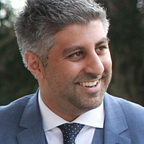What’s YOUR individual purpose?
When asking people about our purpose in life, more often than not, I hear the textbook answer from the Qur’an: “I have created man and jinn to worship me.”
That’s all well and good but what does that actually mean? How do you actualise and internalise that into day-to-day lives? Are we supposed to spend our lives with our foreheads pressed on the ground in prayer? Or is there some deeper meaning?
Sometimes you read something that is so nail on head that you just have to applaud and share it with others.
Originally written by ‘The Usuli’, I honestly couldn’t have said it better myself.
Food for thought, indeed.
“In the Qur’an, Allah tells us the purpose of life and human reality: that we were created to worship Him, to be tested, seek His pleasure and love, and earn eternal bliss for our submission and obedience or punishment for our apathy and arrogance.
This is an ontological fact. Allah is informing us about the reality of this universe, our existence, life and the world. But is that it? How do we act on this ontological fact in our own lives? In the Qur’an, Allah has not told us what our individual purpose within this greater ontological reality is. We have to seek it ourselves.
The ontological and the individual are not mutually exclusive and the purpose we assign to our lives as individuals should be based on the purpose of life as a whole. But the process of arriving at one’s individual purpose in life is different from figuring out how to make our own lives meaningful. The Qur’an and the prayer mat are just the beginning of a longer journey.
Many ‘religious’ Muslims take seriously this larger purpose of life, but then they forget themselves. How we fulfill this grand purpose as individuals will differ. Part of it is fulfilling religious obligations. But another part is how we will contribute to other Muslims, society and human beings as believers.
What purpose will our lives serve on the road back to Allah?
When we ignore this fundamental difference, we settle into cruise control and become people of consumption rather than production. We are content as long as we are ‘worshipping’ Allah and doing religious acts, we don’t need a purpose beyond that, and so our lives become purposeless and aimless. They only look different from others in that we pray 5x a day, fast in Ramadan and frequent Makkah and Madinah for pilgrimage. This can be a problem. A ‘religious’ Muslim can fall into an existential crisis just like anyone else, even if they believe that life does indeed have a purpose.
We desperately need Muslims who see individual purpose in much more meaningful ways. The life of the Muslim cannot just be an imitation of everyone else around us. We need better parenting and families, phDs in all fields and experts in technology, a popular media presence, better Islamic economics, and wealthy and ethical businessmen all of them producing rather than consuming. And they need to be done under the Islamic way of understanding reality and our purpose in life.
On an ontological level, our purpose in life is clear. But on an individual level, how will we do it? What is the unique and individual path we will walk to get there? That is for us to decide, to have ambition for, and to figure out ourselves by learning, exploring our skills and talents and working on self-improvement.
We cannot settle to be another cog in a capitalist society.”
I’m glad someone else has articulated what I’ve been saying for ages in a very succinct and powerful way.
Do you know your unique and individual path you need to walk for you to fulfil your overall purpose?
I have actually put something together which speaks to exactly this and helps you to understand not only our overall purpose, but our individual purpose, too.
Check out the free training here and book a call if this is something you’d like to look into. It’s perhaps the most important thing we must do, if we care about how we spend our time in this world and about attaining the right akhirah.
